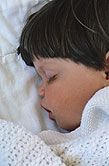Bed Wetting Linked to Lighter Sleep and Inability to Wake
Children who have severe problems with bed wetting may sleep more lightly due to higher brain arousability but cannot completely awaken, and have an overactive bladder, according to a report in the May 29 issue of the New England Journal of Medicine.

WEDNESDAY, May 28 (HealthDay News) -- Children who have severe problems with bed wetting may sleep more lightly due to higher brain arousability but cannot completely awaken, and have an overactive bladder, according to a report in the May 29 issue of the New England Journal of Medicine.
Chung K. Yeung, M.D., and colleagues from Chinese University of Hong Kong, evaluated sleep patterns and cortical arousal associated with bladder activity in 35 children with severe refractory primary nocturnal enuresis (five or more wet nights per week) and 21 normal controls.
The researchers found that patients with nocturnal enuresis had only 44 percent of age-expected bladder capacity and had unstable bladder contractions. They also had significantly more light non-rapid-eye-movement sleep and less deep non-rapid-eye-movement sleep and rapid-eye-movement sleep. These patients had significantly more frequent cortical arousals, which were significantly and positively correlated with unstable bladder contractions.
"Our results suggest an interaction between bladder overactivity and brain arousability (i.e., a 'bladder-brain dialogue') in severe nocturnal enuresis," Yeung and colleagues conclude. "We found that children with enuresis have more light sleep associated with frequent cortical arousals but an inability to awaken completely."
AbstractFull Text (subscription or payment may be required)
Copyright © 2008 ScoutNews, LLC. All rights reserved.